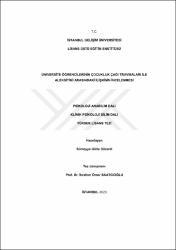| dc.contributor.author | Gülle Düzenli, Sümeyye | |
| dc.date.accessioned | 2021-03-07T17:55:16Z | |
| dc.date.available | 2021-03-07T17:55:16Z | |
| dc.date.issued | 2020 | en_US |
| dc.identifier.uri | https://hdl.handle.net/11363/2669 | |
| dc.description | Danışman: PROF. DR. İBRAHİM ÖMER SAATCIOĞLU
Yer Bilgisi: İstanbul Gelişim Üniversitesi / Lisansüstü Eğitim Enstitüsü / Psikoloji Ana Bilim Dalı / Klinik Psikoloji Bilim Dalı
Konu: Psikoloji = Psychology | en_US |
| dc.description.abstract | Bu çalışma Üniversite öğrencilerinin Çocukluk Çağı Travmaları ile aleksitimi arasındaki ilişkiyi saptayabilmek ve seçilmiş olan bazı sosyo demografik özelliklerin çocukluk çağı travmaları ve aleksitimi ile ilişkisinin ne düzeyde olduğunu belirleyebilmek amacı ile yapılmıştır. Yöntem: Araştırmanın evreni İstanbul Gelişim Üniversitesinde öğrenim gören öğrencilerden oluşmuştur. Araştırmanın örneklemi basit-tesadüfi örneklem modeli ile 200 ön lisans, lisans, yüksek lisans ve doktora düzeyinde öğrenim gören öğrencilerden oluşmaktadır. Bu araştırmada sosyodemografik bilgi formu, Çocukluk Çağı Travmaları ölçeği, Toronto Aleksitimi Ölçeği kullanılmıştır. Bulgular: Araştırma bulguları ışığında toplam puanlar arasında anlamlı ilişkiler bulunmasa da özellikle duyguları tanımada güçlük ve dışa dönük düşünme alt boyutlar açısından bu iki olgunun ilişkili olduğu, regresyon modeli ile yapılan analizlerde aleksitimi puanlarını büyük ölçüde yordayan değişkenlerin duygusal istismar ve ihmal yaşantıları olduğu, ÇÇTÖ duygusal istismar, duygusal ihmal ve ölçek toplam puanı ile yaş arasında istatistiksel olarak pozitif yönde anlamlı bir ilişki olduğu, duyguları tanımada güçlük alt boyut puanları ile yaş arasında istatistiksel olarak negatif yönde anlamlı bir ilişki olduğu belirlenmiştir. Diğer alt boyut puanları ve ölçek toplam puanının ilişkili olmadığı belirlenmiştir. Duyguları tanımada güçlük alt boyut puanları ile yaş arasında istatistiksel olarak negatif anlamlı bir ilişki olduğu, ailede şiddet gören katılımcıların duyguları tanımada güçlük, ÇÇTÖ alt boyutları ile ölçek toplam puanlarının ailesinde şiddet görmeyenlere göre daha yüksek olduğu, annesi ilgisiz tutuma sahip olan katılımcıların ÇÇTÖ alt boyut puanları annesi demokratik ve otoriter tutumda olanlardan daha yüksek, babası otoriter tutumda olanların toplam puanları ise demokratik tutumda olanlara göre daha yüksek bulunmuştur. Sonuç: Araştırma bulguları ışığında aleksitimi puanlarını yordayan değişkenlerin duygusal istismar ve duygusal ihmal yaşantıları olduğu ve Bu bağlamda, duygusal ihmal ve istismar yaşantılarının aleksitimi üzerinde daha etkili faktörler olduğu, ÇÇTÖ toplam puanlarının yaş, ailede şiddet görme, algılanan anne tutumu, algılanan baba tutumu değişkenlerine göre anlamlı derecede farklılaşırken, TAÖ Toplam puanları diğer değişkenlere göre anlamlı derecede farklılık göstermemektedir. | en_US |
| dc.description.abstract | The aim of this study is to investigate the relationship between childhood traumas and alexithymia of university students and examine alexithymia with childhood traumas according to some sociodemographic variables. Method: The population of the research consists of university from Istanbul Gelişim University. The sample of the research consists of 200 associate, undergraduate, graduate and doctorate students. Participants were chosen with a simple-random sample model. A personal information form, Childhood Trauma Scale and Toronto Alexithymia Scale were used in the study. Results: There was no statistically significant relationship between childhood traumas and alexithymia. The sub-dimensions of the childhood trauma scale and the total score of the childhood traumas scale were found to be associated with the subdimension "difficulty in recognition of feelings" of the Toronto alexithymia scale. In addition, it was determined that physical neglect, physical abuse, emotional neglect, sexual abuse and Childhood Trauma-Total scores are significantly related to the subdimension "extrovert thinking" scores. The sub-dimension scores in "difficulty in expressing emotions" were found to be only associated with emotional abuse. It was determined that there were significant differences between the childhood trauma scale sub-scale scores, minimization subscale, and childhood trauma scale scores of the participants who experienced phisical abuse from their caregivers. A significant difference was found between the Toronto alexithymia scale "difficulty in recognizing emotions" sub-dimension score, and phisical abuse variable. Conclusion: When the regression models are evaluated, it is concluded that the variables that predict the alexithymia scores are emotional abuse and neglect, which are the sub-dimensions of childhood traumas. It was found that the total scores of the participants who were exposed to physical abuse from family had difficulty in recognizing emotions with the sub-dimension of the Toronto alexithymia scale, the sub-dimensions of the childhood traumas scale and the childhood trauma scale were not higher than the participants who did not physical abuse from family. It was found that the participants who were exposed to an indifferent attitude of the mother had higher subscale scores in the childhood trauma scale than those whose mother was democratic and authoritarian. It was concluded that the total scores of the participants, whose father was authoritarian, were higher than those of the democratic attitude. | en_US |
| dc.language.iso | tur | en_US |
| dc.publisher | İstanbul Gelişim Üniversitesi Lisansüstü Eğitim Enstitüsü | en_US |
| dc.rights | info:eu-repo/semantics/openAccess | en_US |
| dc.rights | Attribution-NonCommercial-NoDerivs 3.0 United States | * |
| dc.rights.uri | http://creativecommons.org/licenses/by-nc-nd/3.0/us/ | * |
| dc.subject | Çocukluk Çağı Travmaları | en_US |
| dc.subject | Aleksitimi | en_US |
| dc.subject | İstismar | en_US |
| dc.subject | İhmal | en_US |
| dc.subject | Travma | en_US |
| dc.subject | Childhood Trauma | en_US |
| dc.subject | Alexithymia | en_US |
| dc.subject | Neglect | en_US |
| dc.subject | Exploitation | en_US |
| dc.subject | Trauma | en_US |
| dc.title | Üniversite öğrencilerinin çocukluk çağı travmaları ile aleksitimi arasındaki ilişkinin incelenmesi | en_US |
| dc.title.alternative | Investigation of the relationship between university students' childhood trauma and alexithymia | en_US |
| dc.type | masterThesis | en_US |
| dc.department | Lisansüstü Eğitim Enstitüsü | en_US |
| dc.relation.publicationcategory | Tez | en_US |



















